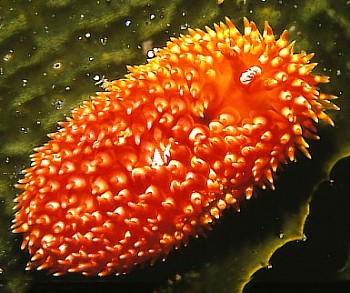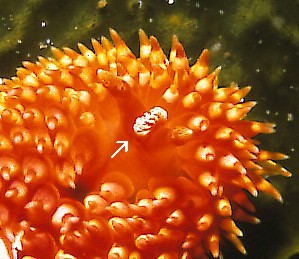Janolus from Port Stephens, NSW
May 24, 2000
From: Peter Flockart


Dear Bill,
Here is a slide taken some years ago at Nelson's Bay, Port Stephens, New South Wales.
I have tried to identify it from the books I have but are no closer than deciding it is an aeolid. Also I have been unable to locate any information regarding aeolids that eject fluid when touched.
It was found at night on a frond of the brown alga Ecklonia in about 1 meter of water, about 10 meters off shore, March 1996. The shoreline here consists of a sandy beach that gives way to a kelp covered rock platform which falls away to ledges at 10 meters and a sandy bottom at 12 meters.
When touches the creature could move fairly quickly but if disturbed enough it would eject a stream of milky white fluid from the protrusion in the middle of the body.
Regards,
Peter Flockart
nelson01@bigpond.com
Flockart, P, 2000 (May 24) Janolus from Port Stephens, NSW. [Message in] Sea Slug Forum. Australian Museum, Sydney. Available from http://www.seaslugforum.net/find/2440Dear Peter,
This is an unnamed species of Janolus which is reasonably common in south eastern Australia.
Although they look somewhat like aeolids, they are more closely related to the arminids. If you go to the Species List and have a look at the animals in the SUBORDER ARMININA you will get an idea of its closest relatives.
Most nudibranchs, because they have lost their shells, have developed some means of protection from predation. Have a look at the mantle glands page for some information on those that have some sort of chemical secretions from their skin. Others are able to drop off parts of their body when attacked [see autotomy page]. Only the aeolids have stinging cells in their cerata.
Many species of Janolus drop of some of their cerata when they are attacked, and as you have seen, some can produce a milky secretion, no doubt as a deterrent.
The large warty lump between the rhinophores [arrow in lower photo] is called a caruncle or inter-rhinophoral protuberance by others. It is characteristic of the genus Janolus and as far as I know its function was unknown. Perhaps your observation of it secreting a milky substance suggests a defensive role.
Best wishes,
Bill Rudman.
Related messages
-
Janolus sp.1 from sthn Queensland
From: Bruce Wilkie, July 12, 2007 -
Janolus sp. 1 from Port Stephens
From: Erik Schlögl, July 3, 2007 -
Janolus from Tasmania, Australia
From: John Smith, January 3, 2007 -
Janolus from Port Stephens, eastern Australia
From: Janice Hempstead, August 4, 2003 -
Janolus 'carinate' - Perhaps
From: Stuart Hutchison, January 7, 2001 -
Janolus from Port Stephens
From: Wayne Ellis, March 3, 1998
